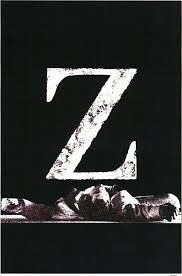
In “Let’s Make More Movies,” the epistemological anarchist Paul Feyerabend wrote this:
The separation of subjects that is such a pronounced characteristic of modern philosophy is … not altogether undesirable. It is a step on the way to a more satisfactory type of myth. What is needed to proceed further is not the return to harmony and stability as too many critics of the status quo, Marxists included, seem to think, but a form of life in which the constituents of older myths —theories, books, images, emotions, sounds, institutions — enter as interacting but antagonistic elements. Brecht’s theatre was an attempt to create such a form of life. He did not entirely succeed. I suggest we try movies instead. (P. Feyerabend, “Let’s Make more Movies,” in The Owl of Minerva: Philosophers on Philosophy, Ch. J. Bontempo and S. J. Odell (eds), McGraw-Hill: New York 1975, pp. 201-210.)

This is the second installment of my second Philosoflick. It’s an experiment in visual philosophy, blending text and images–employing cine-phenomenology, intertitles, and montage–inspired by Feyerabend and Eisenstein, by Chris Marker’s La Jetée, and by W.G. Sebald’s pictorial novels.
I AM by birth a Genevese; and my family is one of the most distinguished of that republic. My ancestors had been for many years counsellors and syndics; and my father had filled several public situations with honour and reputation. He was respected by all who knew him for his integrity and indefatigable attention to public business. He passed his younger days perpetually occupied by the affairs of his country; and it was not until the decline of life that he thought of marrying, and bestowing on the state sons who might carry his virtues and his name down to posterity.
*************************************************************************************************
I’m thinking: Frankenstein is all about humanity, natural science, and nature: but what is nature?….
Then, suddenly, a rush of other texts and images, literally tumbling over one another in their eagerness to be attended to…
*************************************************************************************************
[T]wo things fill the mind with ever new and increasing admiration and reverence, the more often and more steadily one reflects on them: the starry heavens above me and the moral law within me. I do not need to search for them and merely conjecture them as though they were veiled in obscurity or on the transcendent region beyond my horizon; I see them before me and connect them immediately with the consciousness of my existence. (I. Kant, Critique of Practical Reason, 5: 161-162)

It is quite certain that we can never adequately come to know the organized beings and their internal possibility in accordance with merely mechanical principles of nature, let alone explain them; and this is so certain that we can boldly say that it would be absurd for humans to make an attempt or to hope that there could ever arise a Newton who could make comprehensible even the generation of a blade of grass that no intention has ordered: rather we must absolutely deny this insight to human beings (I. Kant, Critique of the Power of Judgment 5: 400)
![Grass Waves [IGP6001]](https://i0.wp.com/s.yimg.com/fz/api/res/1.2/777FLb2pPb6ZOGI2qEZN7Q--/YXBwaWQ9c3JjaGRkO2g9MjkyO3E9OTU7dz01MDA-/http://farm5.staticflickr.com/4033/4281646845_0d1092b1a4_z.jpg?w=584&ssl=1)
My Heart Leaps Up
A rainbow in the sky:
So was it when my life began;
So is it now I am a man;
So be it when I shall grow old,
Or let me die!
The Child is father of the Man;
And I could wish my days to be
Bound each to each by natural piety. (William Wordsworth)





As the circumstances of his marriage illustrate his character, I cannot refrain from relating them. One of his most intimate friends was a merchant, who, from a flourishing state, fell, through numerous mischances, into poverty. This man, whose name was Beaufort, was of a proud and unbending disposition, and could not bear to live in poverty and oblivion in the same country where he had formerly been distinguished for his rank and magnificence. Having paid his debts, therefore, in the most honourable manner, he retreated with his daughter to the town of Lucerne, where he lived unknown and in wretchedness. My father loved Beaufort with the truest friendship, and was deeply grieved by his retreat in these unfortunate circumstances. He grieved also for the loss of his society, and resolved to seek him out and endeavour to persuade him to begin the world again through his credit and assistance.
*************************************************************************************************
Back now to people, human-all-too-human, nature becoming painfully self-conscious….
*************************************************************************************************

Beaufort had taken effectual measures to conceal himself; and it was ten months before my father discovered his abode. Overjoyed at this discovery, he hastened to the house, which was situated in a mean street, near the Reuss. But when he entered, misery and despair alone welcomed him. Beaufort had saved but a very small sum of money from the wreck of his fortunes; but it was sufficient to provide him with sustenance for some months, and in the meantime he hoped to procure some respectable employment in a merchant’s house. The interval was consequently spent in inaction; his grief only became more deep and rankling, when he had leisure for reflection; and at length it took so fast hold of his mind, that at the end of three months he lay on a bed of sickness, incapable of any exertion.

His daughter attended him with the greatest tenderness; but she saw with despair that their little fund was rapidly decreasing, and that there was no other prospect of support. But Caroline Beaufort possessed a mind of an uncommon mould; and her courage rose to support her in her adversity. She procured plain work; she plaited straw; and by various means contrived to earn a pittance scarcely sufficient to support life.

Several months passed in this manner. Her father grew worse; her time was more entirely occupied in attending him; her means of subsistence decreased; and in the tenth month her father died in her arms, leaving her an orphan and a beggar. This last blow overcame her; and she knelt by Beaufort’s coffin, weeping bitterly, when my father entered the chamber. He came like a protecting spirit to the poor girl, who committed herself to his care, and after the interment of his friend he conducted her to Geneva, and placed her under the protection of a relation. Two years after this event Caroline became his wife.
*************************************************************************************************
Strange, sudden thought: Did Caroline look like Jeanne Crain? I was just streaming the idiotically pleasant “You Were Meant For Me” ….
*******************************************************************************************


When my father became a husband and a parent, he found his time so occupied by the duties of his new situation, that he relinquished many of his public employments, and devoted himself to the education of his children. Of these I was the eldest, and the destined successor to all his labours and utility. No creature could have more tender parents than mine. My improvement and health were their constant care, especially as I remained for several years their only child. But before I continue my narrative, I must record an incident which took place when I was four years of age.

My father had a sister, whom he tenderly loved, and who had married early in life an Italian gentleman. Soon after her marriage, she had accompanied her husband into his native country, and for some years my father had very little communication with her. About the time I mentioned she died; and a few months afterwards he received a letter from her husband, acquainting him with his intention of marrying an Italian lady, and requesting my father to take charge of the infant Elizabeth, the only child of his deceased sister. “It is my wish,” he said, “that you should consider her as your own daughter, and educate her thus. Her mother’s fortune is secured to her, the documents of which I will commit to your keeping. Reflect upon this proposition; and decide whether you would prefer educating your niece yourself to her being brought up by a stepmother.”
Does “stepmother” analytically entail “wicked”?

My father did not hesitate, and immediately went to Italy, that he might accompany the little Elizabeth to her future home. I have often heard my mother say, that she was at that time the most beautiful child she had ever seen, and shewed signs even then of a gentle and affectionate disposition. These indications, and a desire to bind as closely as possible the ties of domestic love, determined my mother to consider Elizabeth as my future wife; a design which she never found reason to repent.
*************************************************************************************************
Elizabeth, the young Elizabeth…
*************************************************************************************************

From this time Elizabeth Lavenza became my playfellow, and, as we grew older, my friend. She was docile and good tempered, yet gay and playful as a summer insect. Although she was lively and animated, her feelings were strong and deep, and her disposition uncommonly affectionate. No one could better enjoy liberty, yet no one could submit with more grace than she did to constraint and caprice. Her imagination was luxuriant, yet her capability of application was great. Her person was the image of her mind; her hazel eyes, although as lively as a bird’s, possessed an attractive softness. Her figure was light and airy; and, though capable of enduring great fatigue, she appeared the most fragile creature in the world. While I admired her understanding and fancy, I loved to tend on her, as I should on a favourite animal; and I never saw so much grace both of person and mind united to so little pretension.

Every one adored Elizabeth. If the servants had any request to make, it was always through her intercession. We were strangers to any species of disunion and dispute; for although there was a great dissimilitude in our characters, there was an harmony in that very dissimilitude. I was more calm and philosophical than my companion; yet my temper was not so yielding. My application was of longer endurance; but it was not so severe whilst it endured. I delighted in investigating the facts relative to the actual world; she busied herself in following the aërial creations of the poets. The world was to me a secret, which I desired to discover; to her it was a vacancy, which she sought to people with imaginations of her own.

My brothers were considerably younger than myself; but I had a friend in one of my schoolfellows, who compensated for this deficiency. Henry Clerval was the son of a merchant of Geneva, an intimate friend of my father. He was a boy of singular talent and fancy. I remember, when he was nine years old, he wrote a fairy tale, which was the delight and amazement of all his companions. His favourite study consisted in books of chivalry and romance; and when very young, I can remember, that we used to act plays composed by him out of these favourite books, the principal characters of which were Orlando, Robin Hood, Amadis, and St. George.
*************************************************************************************************
Georges… and Jeanne again, with all good wishes to all Georges…
*************************************************************************************************



No youth could have passed more happily than mine. My parents were indulgent, and my companions amiable. Our studies were never forced; and by some means we always had an end placed in view, which excited us to ardour in the prosecution of them. It was by this method, and not by emulation, that we were urged to application. Elizabeth was not incited to apply herself to drawing, that her companions might not outstrip her; but through the desire of pleasing her aunt, by the representation of some favourite scene done by her own hand. We learned Latin and English, that we might read the writings in those languages; and so far from study being made odious to us through punishment, we loved application, and our amusements would have been the labours of other children. Perhaps we did not read so many books, or learn languages so quickly, as those who are disciplined according to the ordinary methods; but what we learned was impressed the more deeply on our memories.
*************************************************************************************************
Oh god, school… Vigo, IF—-
*************************************************************************************************



In this description of our domestic circle I include Henry Clerval; for he was constantly with us. He went to school with me, and generally passed the afternoon at our house: for being an only child, and destitute of companions at home, his father was well pleased that he should find associates at our house; and we were never completely happy when Clerval was absent.

I feel pleasure in dwelling on the recollections of childhood, before misfortune had tainted my mind, and changed its bright visions of extensive usefulness into gloomy and narrow reflections upon self. But, in drawing the picture of my early days, I must not omit to record those events which led, by insensible steps to my after tale of misery: for when I would account to myself for the birth of that passion, which afterwards ruled my destiny, I find it arise, like a mountain river, from ignoble and almost forgotten sources; but, swelling as it proceeded, it became the torrent which, in its course, has swept away all my hopes and joys.











Natural philosophy is the genius that has regulated my fate; I desire therefore, in this narration, to state those facts which led to my predilection for that science. When I was thirteen years of age, we all went on a party of pleasure to the baths near Thonon: the inclemency of the weather obliged us to remain a day confined to the inn. In this house I chanced to find a volume of the works of Cornelius Agrippa. I opened it with apathy; the theory which he attempts to demonstrate, and the wonderful facts which he relates, soon changed this feeling into enthusiasm. A new light seemed to dawn upon my mind; and, bounding with joy, I communicated my discovery to my father. I cannot help remarking here the many opportunities instructors possess of directing the attention of their pupils to useful knowledge, which they utterly neglect. My father looked carelessly at the title-page of my book, and said, “Ah! Cornelius Agrippa! My dear Victor, do not waste your time upon this; it is sad trash.”
*************************************************************************************************
If the Matrix view of the world is basically correct, then everything is sad trash….
*************************************************************************************************

If, instead of this remark, my father had taken the pains to explain to me, that the principles of Agrippa had been entirely exploded, and that a modern system of science had been introduced, which possessed much greater powers than the ancient, because the powers of the latter were chimerical, while those of the former were real and practical; under such circumstances, I should certainly have thrown Agrippa aside, and, with my imagination warmed as it was, should probably have applied myself to the more rational theory of chemistry which has resulted from modern discoveries. It is even possible, that the train of my ideas would never have received the fatal impulse that led to my ruin. But the cursory glance my father had taken of my volume by no means assured me that he was acquainted with its contents; and I continued to read with the greatest avidity.
*************************************************************************************************
Can fMRIs see our ideas with X-ray eyes?
*************************************************************************************************

When I returned home, my first care was to procure the whole works of this author, and afterwards of Paracelsus and Albertus Magnus. I read and studied the wild fancies of these writers with delight; they appeared to me treasures known to few beside myself; and although I have often wished to communicate these secret stores of knowledge to my father, yet his indefinite censure of my favourite Agrippa always withheld me. I disclosed my discoveries to Elizabeth, therefore, under a promise of strict secrecy; but she did not interest herself in the subject, and I was left by her to pursue my studies alone.
*************************************************************************************************
Frankenscience redux….

It may appear very strange, that a disciple of Albertus Magnus should arise in the eighteenth century; but our family was not scientifical, and I had not attended any of the lectures given at the schools of Geneva. My dreams were therefore undisturbed by reality; and I entered with the greatest diligence into the search of the philosopher’s stone and the elixir of life. But the latter obtained my undivided attention: wealth was an inferior object; but what glory would attend the discovery, if I could banish disease from the human frame, and render man invulnerable to any but a violent death!


Nor were these my only visions. The raising of ghosts or devils was a promise liberally accorded by my favourite authors, the fulfillment of which I most eagerly sought; and if my incantations were always unsuccessful, I attributed the failure rather to my own inexperience and mistake than to a want of skill or fidelity in my instructors.
************************************************************************************************
Descartes in a celebrated passage in Discours VI advocates the replacement of “the speculative philosophy of the schools” by “a practical [philosophy]” which will make us “lords and masters of nature.”
The truly apocalyptic view of the world is that things do not repeat themselves. It isn‘t absurd, e.g., to believe that the age of science and technology is the beginning of the end for humanity; the idea of great progress is a delusion, along with the idea that the truth will ultimately be known; that there is nothing good or desirable about scientific knowledge and that mankind, in seeking it, is falling into a trap. It is by no means obvious that this is not how things are. (L. Wittgenstein, Culture and Value, trans. P. Winch (Chicago, IL: Univ. of Chicago Press, 1980), p. 56e)
*************************************************************************************************







The natural phænomena that take place every day before our eyes did not escape my examinations. Distillation, and the wonderful effects of steam, processes of which my favourite authors were utterly ignorant, excited my astonishment; but my utmost wonder was engaged by some experiments on an air-pump, which I saw employed by a gentleman whom we were in the habit of visiting.

The ignorance of the early philosophers on these and several other points served to decrease their credit with me: but I could not entirely throw them aside, before some other system should occupy their place in my mind.
*************************************************************************************************
Leviathan + the air-pump = scientistic statism, that’s the Frankenscience system….

When I was about fifteen years old, we had retired to our house near Belrive, when we witnessed a most violent and terrible thunder-storm. It advanced from behind the mountains of Jura; and the thunder burst at once with frightful loudness from various quarters of the heavens. I remained, while the storm lasted, watching its progress with curiosity and delight. As I stood at the door, on a sudden I beheld a stream of fire issue from an old and beautiful oak, which stood about twenty yards from our house; and so soon as the dazzling light vanished, the oak had disappeared, and nothing remained but a blasted stump. When we visited it the next morning, we found the tree shattered in a singular manner. It was not splintered by the shock, but entirely reduced to thin ribbands of wood. I never beheld anything so utterly destroyed.

The catastrophe of this tree excited my extreme astonishment; and I eagerly inquired of my father the nature and origin of thunder and lightning. He replied, “Electricity;” describing at the same time the various effects of that power. He constructed a small electrical machine, and exhibited a few experiments; he made also a kite, with a wire and string, which drew down that fluid from the clouds.

This last stroke completed the overthrow of Cornelius Agrippa, Albertus Magnus, and Paracelsus, who had so long reigned the lords of my imagination. But by some fatality I did not feel inclined to commence the study of any modern system; and this disinclination was influenced by the following circumstance.
My father expressed a wish that I should attend a course of lectures upon natural philosophy, to which I cheerfully consented. Some accident prevented my attending these lectures until the course was nearly finished. The lecture, being therefore one of the last, was entirely incomprehensible to me. The professor discoursed with the greatest fluency of potassium and boron, of sulphates and oxyds, terms to which I could affix no idea; and I became disgusted with the science of natural philosophy, although I still read Pliny and Buffon with delight, authors, in my estimation, of nearly equal interest and utility.
My occupations at this age were principally the mathematics, and most of the branches of study appertaining to that science. I was busily employed in learning languages; Latin was already familiar to me, and I began to read some of the easiest Greek authors without the help of a lexicon. I also perfectly understood English and German. This is the list of my accomplishments at the age of seventeen; and you may conceive that my hours were fully employed in acquiring and maintaining a knowledge of this various literature.

Another task also devolved upon me, when I became the instructor of my brothers. Ernest was six years younger than myself, and was my principal pupil. He had been afflicted with ill health from his infancy, through which Elizabeth and I had been his constant nurses: his disposition was gentle, but he was incapable of any severe application. William, the youngest of our family, was yet an infant, and the most beautiful little fellow in the world; his lively blue eyes, dimpled cheeks, and endearing manners, inspired the tenderest affection.


Such was our domestic circle, from which care and pain seemed for ever banished. My father directed our studies, and my mother partook of our enjoyments. Neither of us possessed the slightest pre-eminence over the other; the voice of command was never heard amongst us; but mutual affection engaged us all to comply with and obey the slightest desire of each other.
*************************************************************************************************